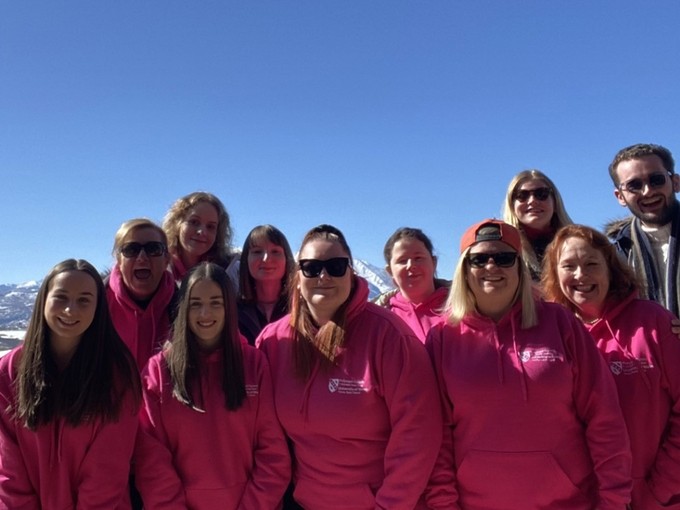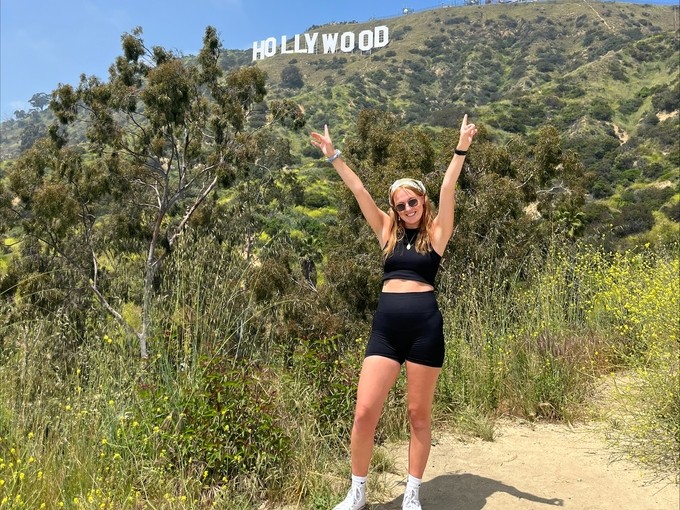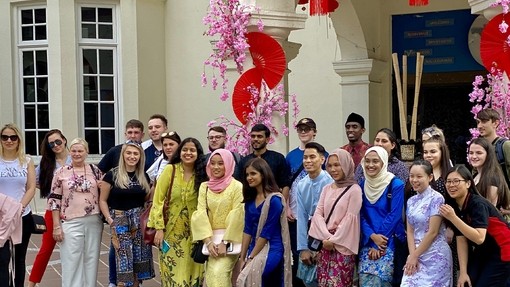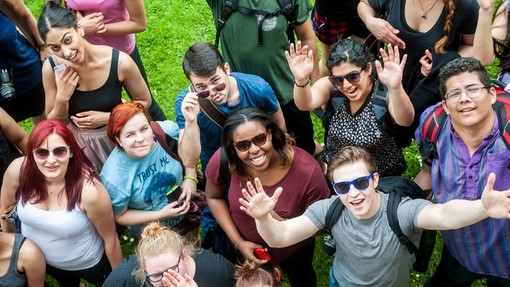
Global Opportunities
Study Abroad & Exchange
Travel, immerse yourself in a new culture, meet new friends, and try new foods, all while working towards your degree. Funding is open to UWTSD students on many different programmes with numerous exchange opportunities across the USA, Canada, China, Europe, and more!
Study Abroad & Exchange Opportunities
We believe that global experiences are an essential part of a well-rounded education. That’s why we’ve partnered with a diverse range of universities across the globe to offer you the chance to expand your horizons, immerse yourself in different cultures, and gain a fresh perspective on your field of study.
Whether you aspire to experience the diverse landscapes of North America, immerse yourself in the bustling cities of China, or delve into the rich history of Europe our partner universities provide a unique opportunity to enhance your academic journey.
Take the first step towards an unforgettable adventure by exploring our list of partner universities.
Work and Volunteering Opportunities
Taking part in a volunteering programme gives you a chance to help make a difference, gain some experience, and explore another country. We have links with several ethical, responsible volunteering organizations as well as work placements.
You will:
- be part of a cultural exchange which fosters unique learning, understanding, equality, and respect.
- make small contributions to existing local initiatives, guided by local people in a structure of collaboration.
- develop soft skills, meet like-minded people, and make a sustainable, ethical contribution.
You will be able to apply the knowledge you have learned abroad in numerous ways, and leave the program with highly employable skills such as the ability to work as part of a team, to communicate well, and to see things from a different perspective with a deeper understanding of a different culture.
-
The volunteer projects are locally led in partnership with the Fijian government; you will learn to work in partnership with the local municipality, and will experience complete cultural immersion in a rural village as you live with a traditional Fijian family and work on community and local building projects. You will be able to contribute to education, youth, sports development, health, mental health promotion or building programmes during your time volunteering.
-
We have four internships available for UWTSD students. Working in partnership with Think Pacific, you will support Fijian government ministries, businesses, and/or charities to implement the Fiji National Development Plan and UN Sustainable Development Goals. You will gain global understanding, charity sector experience, and create social impact as you help tackle international development issues and achieve real outcomes for our partners in Fiji. Learn more here: Think Pacific
What is a virtual internship? Virtual internships are internships that are completed online — or remotely — from your home. All you need is a computer, phone, and internet connection. Think Pacific will connect you with real life projects supporting communities in the Fiji islands.
-
Funding Opportunities

Funding Opportunities
All UWTSD students who submit a Go Global Application will be automatically considered for funding. The Outward Mobility Team will place you under either Taith or Turing funding, depending on your unique circumstances. Students going abroad will not need to apply for this funding. This funding will not cover all costs, but is meant to help supplement students personal savings, loans, and other financial sources to go abroad.
F&Q
-
UCAS can be tricky to understand and engage with. UCAS has come up with this handy jargon buster to allow potential student to fully understand what it is all about.
Adviser – someone who provides you with information, advice, and support with your application. This could be a teacher, tutor, counsellor, or agent.
Apply – the name of our online application system. (For postgraduate courses, Apply is combined with UCAS Hub.)
Bachelor’s degree – a three or four year course you can take in undergraduate higher education after you’ve finished further education – also known as a ‘first degree’ or ‘undergraduate degree’. Most courses are either a Bachelor of Arts or Bachelor of Science.
Buzzword – for UCAS Undergraduate applications, your school, college, or centre will give you a buzzword so you can link your application to them. It’s a word you add to your application when you register to make a UCAS Undergraduate application (unless you’re applying independently).
Centre – a school, college, or organisation that can help students apply to higher education.
Changed course offer – in your application, you might get one of these if you haven’t met your conditions, or if the university or college has made changes to the courses they run. It might involve a different start date or point of entry, or a different course altogether.
Choice – a choice is a course you apply for on your application – many students make multiple choices to increase their chances of getting a place.
Clearing – in a UCAS Undergraduate application, Clearing is another service you can use to look for alternative courses. If you didn’t get a place on a course – whether you didn’t receive offers, declined your offers, or didn’t get the grades you needed – Clearing allows you to apply for courses that still have vacancies.
College – a provider of further and higher education. When we use the term ‘uni’ or ‘university’, this is often a generic reference that incorporates colleges too. For example, when we say ‘applying to university’, we mean ‘applying to university or college’, but in a more concise way.
Conditional offer – in your application, an offer of a place on a course subject to conditions. To be accepted on the course, you’ll need to meet the conditions – usually related to your exam results. This is a common type of offer for students applying directly from further education.
Confirmation – in your application, the outcome of a conditional offer you’ve accepted. If you meet the conditions, your place will be made unconditional (meaning you’ve got a place on the course) – if not, the offer will be declined.
Conservatoire – a provider of performance-based music, dance, screen, and drama courses.
Course – there are many different courses across different levels, subjects, and locations – from foundation degrees to PhDs.
Course and training providers – a university, college, conservatoire, School Direct school, or other provider offering higher education courses.
Deferral – in your application, this is what you do if you’d like to carry an offer over to start it in the following academic year.
Entry requirements – this is what the course provider recommends you need to do/have to get on the course – from qualifications and specific subjects or grades, to interviews, admissions tests, and medical requirements. You aren’t guaranteed an offer if you meet or already have these.
Extra – in a UCAS Undergraduate application, Extra is a service you can use to apply for alternative places if you do not hold an offer from your first five choices.
Fresher – slang term for students in their first year of university.
Firm choice – in your application, an offer you accept as your first choice.
Graduate – a student who has completed and graduated from an undergraduate course – they can now apply for postgraduate courses if they’d like to.
Higher education (HE) – the level of education we can help you apply to – from undergraduate courses when you’ve finished further education, to postgraduate courses you can move on to after graduating from an undergraduate degree.
Insurance choice – in your application, an offer you accept as your second choice – just in case you don’t meet the conditions of your firm offer.
Personal ID – the ten-digit number you get when you register to Apply – displayed in 123-456-7890 format on every email we send you. You’ll be asked for this if you get in touch with our Customer Experience Centre.
Personal statement – a piece of text applicants write to show why they’re applying and why they’d be a great student for a course provider to accept.
Predicted grades – the grades a teacher, tutor, or other adviser qualified to remark on a student’s academic suitability believes they will achieve when they complete their secondary qualification.
Referee – in your application, someone who provides a reference for you.
Sandwich course – a course with an additional year where you work in the profession you’re studying for.
Tariff – the UCAS Tariff is the system for allocating points to the different qualifications you can use to get into undergraduate higher education. Not all qualifications will be included in the Tariff. It is for use in admissions only and is not transferable to the job market.
Track – the name of our online tracking system where you can see how your application is progressing. Here you can reply to offers and make amendments, like changing your email address etc. (For postgraduate courses, Apply is combined with Hub.)
UCAS – the Universities and Colleges Admissions Service in the UK. This includes the main UCAS Undergraduate application service, as well as the other services UCAS runs, i.e., UCAS Conservatoires, UCAS Teacher Training, and UCAS Postgraduate. UCAS also help students from 13 years old onwards with UCAS Progress.
Unconditional offer – in your application, an offer of a place on a course with no conditions – the place is yours if you want it.
Undergraduate – the first level of study in higher education. If you graduate from an undergraduate degree, you can move on to postgraduate study.
University – (or ‘uni’ for short) – a provider of higher education.
Unsuccessful – in your application, either you haven’t been made an offer or you haven’t met the conditions of a conditional offer.
Withdrawal – in your application, before the decision has been made to make you an offer or not, either you or the university or college can withdraw a choice.






